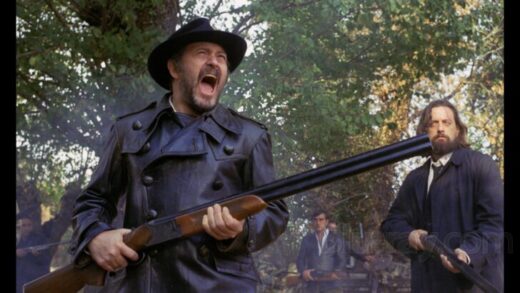The Addiction (1995)
![]()
The Addiction (1995) Directed by Abel Ferrara
The most unpretentiously pretentious philosophical movie ever made. The forbidding cosmic consternations of Abel Ferrara’s idiosyncratic vampire picture are so weighty, dense in their theological deconstructions of vampirism as a polysemous metaphor about the burden of human existence, that to find an absolute, ultimate meaning or factual rationale for this esoteric pseudo-eschatological study behind the cosmology of the human purpose would be to gainsay its abstract nature. So, just as when I first watched this heady romantic black-and-white wistful nightmare, I still refuse to specify its formal commitments, for to do so would be to infringe on its ethereal artistry and its incorporeal theoretical beauty. Lili Taylor – in a very physical, adventurous performance – plays Kathleen, a doctoral student in philosophy at New York University. She doesn’t acknowledge it, but the darkness engulfs her, and when she least anticipates it, she is intercepted by “Casanova” (Annabella Sciorra), who bites her neck with standoffish, aggressive impatience. Now Kathleen is a daughter of the night, a human blood junkie.
Of the many life-like depictions Ferrara has given us of the grand American metropolis, this is the most expressionistic of them all, not necessarily for its effective, downbeat application of the chiaroscuro technique, but for the sheer audacity of treating the sleazy New York nocturnal streets like a gothic Transylvanian landscape, for portraying the lowlifes on the city streets as the living dead, and for shooting the nighttime grimness with pitch black textures as Karl Freund or Arthur Edison would have done it. Naturally the latter is the magnificent, undervalued photographic genius of Ken Kelsch – best known for his frequent collaborations with Ferrara – the impenetrably mesmerizing imagery he captures here with his keen eye is the pinnacle of American art cinema of the 90’s, his crowning achievement. By having such a rigorous formal backbone, Abel Ferrara’s fresh take on vampire mythology proves to be his most complicated cinematic endeavor in a filmography full of complicated cinematic endeavors.
What sets The Addiction apart from Ferrara’s other films is that this one is inscrutable, abstruse and inexhaustible. That doesn’t mean, however, that one can’t enjoy its brooding cityscape of bloodsuckers in New York. The moody sublimity of Lili Taylor’s performance helps keep Ferrara’s formal coldness from being altogether cold; amid the godless, bleak Nietzscheanism and nihilistic imagery, Taylor’s sensuous outbursts suggest humanity and redemption. The sensitivity as well as the coldness of the character ultimately formulates many of the questions that raise a debate beyond the simple reference to drug addiction. The essentials of the motifs are more the dilemmas of human existence in a universe where sinning is inescapable. Here none of the victims of the vampires are escaping or avoiding being bitten, rather they seek to be bitten. Artfully, Ferrara juxtaposes real photographs of human atrocities in aleatory instances in the film; in fact, everything in this film – with the exception of Lili Taylor’s character – is about ephemeral instances. Christopher Walken unexpectedly shows up as a wise, teetotal vampire, philosophizes with Kathleen for a while, and then we don’t see him anymore. It’s an ironic move to witness how immortal beings turn out to be impermanent in a film that muses on perpetual human guilt in the face of genocidal fantasies.
The dour truth behind all the philosophical rigmarole of the dialogues is that attempting to comprehend the incomprehensible is a futile pursuit, but discussing it at least helps us cope with our existence. Part pop vampire exploitation, part art cinema, part nonsensical shock horror, but each of these facets address the same issues just in slightly altered manners. In the end Abel Ferrara’s sombre hip-hop sleazy vision of vampirism is a whole sensory and intellectual trip that, well, renders every vampire flick made after 1995 pretty much irrelevant.






